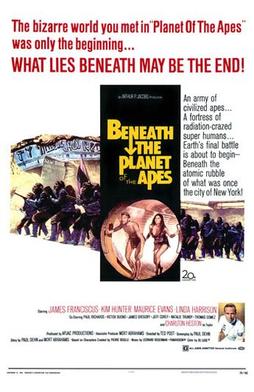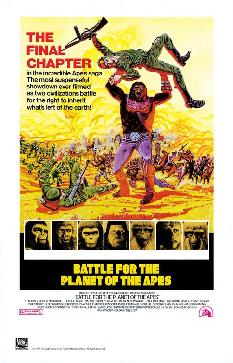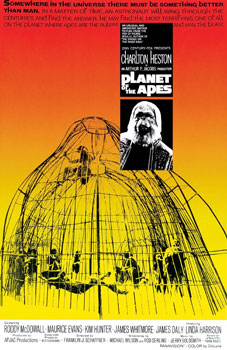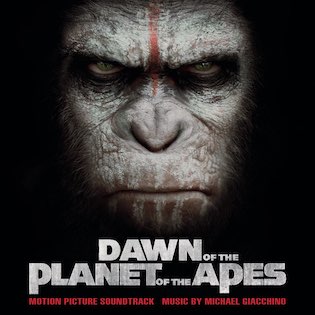
Chernobyl or Chornobyl is a partially abandoned city in the Chernobyl Exclusion Zone, situated in the Vyshhorod Raion of northern Kyiv Oblast, Ukraine. Chernobyl is about 90 kilometres (60 mi) north of Kyiv, and 160 kilometres (100 mi) southwest of the Belarusian city of Gomel. Before its evacuation, the city had about 14,000 residents. While living anywhere within the Chernobyl Exclusion Zone is technically illegal today, authorities tolerate those who choose to live within some of the less irradiated areas, and around 1,000 people live in Chernobyl today.

Forbidden Planet is a 1956 American science fiction film from Metro-Goldwyn-Mayer, produced by Nicholas Nayfack, and directed by Fred M. Wilcox from a script by Cyril Hume that was based on an original film story by Allen Adler and Irving Block. It stars Walter Pidgeon, Anne Francis, and Leslie Nielsen. Shot in Eastmancolor and CinemaScope, it is considered one of the great science fiction films of the 1950s, a precursor of contemporary science fiction cinema. The characters and isolated setting have been compared to those in William Shakespeare's The Tempest, and the plot contains certain happenings analogous to the play, leading many to consider it a loose adaptation.

Beneath the Planet of the Apes is a 1970 American science fiction film directed by Ted Post from a screenplay by Paul Dehn, based on a story by Dehn and Mort Abrahams. The film is the sequel to Planet of the Apes (1968) and the second installment in the original Planet of the Apes film series. It stars James Franciscus, Kim Hunter, Maurice Evans, and Linda Harrison, and features Charlton Heston in a supporting role. In the film, another spacecraft arrives on the planet ruled by apes, carrying astronaut Brent (Franciscus), who searches for Taylor (Heston).
Zone or The Zone may refer to:

Jerrald King Goldsmith was an American composer known for his work in film and television scoring. He composed scores for five films in the Star Trek franchise and three in the Rambo franchise, as well as for films including Logan's Run, Planet of the Apes, Tora! Tora! Tora!, Patton, Papillon, Chinatown, The Omen, Alien, Poltergeist, The Secret of NIMH, Medicine Man, Gremlins, Hoosiers, Total Recall, Basic Instinct, Air Force One, L.A. Confidential, Mulan, and The Mummy. He also composed the fanfares accompanying the production logos used by multiple major film studios, and music for the Disney attraction Soarin'.

Pripyat, also known as Prypiat, is an abandoned city in northern Ukraine, located near the border with Belarus. Named after the nearby river, Pripyat, it was founded on 4 February 1970 as the ninth atomgrad to serve the nearby Chernobyl Nuclear Power Plant, which is located in the adjacent ghost city of Chernobyl. Pripyat was officially proclaimed a city in 1979 and had grown to a population of 49,360 by the time it was evacuated on the afternoon of 27 April 1986, one day after the Chernobyl disaster.

Battle for the Planet of the Apes is a 1973 American science fiction film directed by J. Lee Thompson from a screenplay by John William Corrington and Joyce Hooper Corrington, based on a story by Paul Dehn. The film is the sequel to Conquest of the Planet of the Apes (1972) and the fifth and final installment in the original Planet of the Apes film series. It stars Roddy McDowall, Claude Akins, Natalie Trundy, Severn Darden, Lew Ayres, Paul Williams, and John Huston. In the film, after conquering the oppressive humans, Caesar (McDowall) tries to keep the peace amongst the humans and apes, but uprisings endure.

The Chernobyl Nuclear Power Plant Zone of Alienation is an officially designated exclusion zone around the site of the Chernobyl nuclear reactor disaster. It is also commonly known as the Chernobyl Exclusion Zone, the 30-Kilometre Zone, or simply The Zone.

S.T.A.L.K.E.R.: Shadow of Chernobyl is a first-person shooter survival horror video game developed by GSC Game World and published by THQ in 2007 following a long development. The game is set in an alternative reality, where a second disaster of mysterious origin occurred at the Chernobyl Exclusion Zone, causing strange changes in the area around it. The game features a non-linear storyline and includes role-playing gameplay elements such as trading and two-way communication with non-player characters.
An exclusion zone is a territorial division established for various, case-specific purposes.

The Chernobyl disaster is the world's worst nuclear accident to date.
Bright Eyes may refer to:

Planet of the Apes is a 1968 American science fiction film directed by Franklin J. Schaffner from a screenplay by Michael Wilson and Rod Serling, loosely based on the 1963 novel by Pierre Boulle. The film stars Charlton Heston, Roddy McDowall, Kim Hunter, Maurice Evans, James Whitmore, James Daly, and Linda Harrison. In the film, an astronaut crew crash-lands on a strange planet in the distant future. Although the planet appears desolate at first, the surviving crew members stumble upon a society in which apes have evolved into creatures with human-like intelligence and speech. The apes have assumed the role of the dominant species and humans are mute creatures wearing animal skins.
Military occupations of France may refer to:
Planet of the Apes is a film and media franchise.
A stalker is someone who engages in stalking.

Markiyan Kamysh is a Ukrainian author, known for his excursions into the Chernobyl Exclusion Zone.

War for the Planet of the Apes (Original Motion Picture Soundtrack) is the score album for the 2017 film of the same name directed by Matt Reeves. The film is the sequel to Dawn of the Planet of the Apes (2014) and the third installment in the Planet of the Apes reboot franchise. The film score is composed by Reeves' frequent collaborator Michael Giacchino, and was digitally released through iTunes and Amazon on July 14, 2017 by Sony Classical Records. It was later released in physical formats on July 28. The score received critical acclaim from critics and fetched numerous accolades.

Dawn of the Planet of the Apes (Original Motion Picture Soundtrack) is the score album to the 2014 film of the same name. Directed by Matt Reeves, the film is a sequel to Rise of the Planet of the Apes (2011) and the second installment in the Planet of the Apes reboot franchise. Reeves' frequent collaborator Michael Giacchino, who previously worked in Cloverfield (2008) and Let Me In (2010), composed the film's score. He significantly created themes deriving his own compositions from Lost (2004–2010) and Super 8, and had referenced Jerry Goldsmith's themes from the original 1968 film. The soundtrack was released by Sony Classical Records on July 7, 2014, and received polarising reviews with praise over the score's integration and criticism directed on the album length and lack of significant themes, with some comparing it as inferior to Giacchino's compositions.












